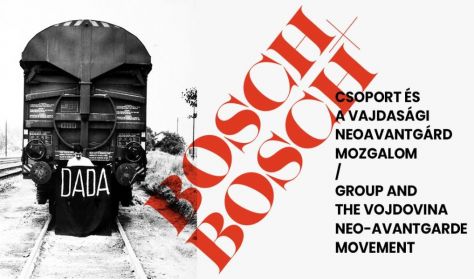
Bosch+Bosch
BOSCH+BOSCH GROUP AND THE VOJVODINA NEO-AVANT-GARDE MOVEMENT

BOSCH+BOSCH GROUP AND THE VOJVODINA NEO-AVANT-GARDE MOVEMENT
Ön egy múltbeli eseményre keresett rá. Kérjük, válogasson aktuális kínálatunkból a Jegy.hu keresőjében!
The Bosch+Bosch group was founded on August 27th, 1969, exactly 50 years ago by a band of young artists in Subotica. The collective was the second such circle in the former Yugoslavia. It is important to note that the group emerged outside the country’s larger centres of art and culture, at same peripheral region that had been influenced by Hungarian activism in the interwar period (Lajos Kassák, Sándor Barta).
The majority of the group’s members were of Hungarian descent (Attila Csernik, Katalin Ladik, László Kerekes, László Szalma, Bálint Szombathy), but members whose mother tongue was Southern Slavic (Slavko Matković, Ante Vukov) also spoke good Hungarian. In the course of their praxis, members of the Bosch+Bosch group pursued diversified artistic – and partly literary – activities on the boundaries between different branches and genres of art, with the endeavour of expanding these both linguistically and conceptually.
No sooner had their self-organised group come to life than they turned their back on traditional means of expression, boldly and tenaciously exploring the timely paradigms of international art. Small-town life, the strangely constricted world of the borderland and the lack of institutional infrastructure failed to pave the way to international fame, but they did leave a historically significant mark on Yugoslav “practices of new art”. In the years and decades following the disbanding of the collective, some of them matured into internationally significant figures of the period (Katalin Ladik, Bálint Szombathy). A great part of the group’s oeuvre has recently been integrated into Hungarian art history, but so far, only fragments of it have been made available to the professional public.
The exhibition also introduces the work of Kôd and the neo-avant-garde groups active in Novi Sad around the early ‘70s.
Brindsley és Carol fiatal pár. A férfi feltörekvő szobrász, és menyasszonyával kölcsönvettek pár elegáns bútordarabot és műtárgyat a szomszédban lakó Harold Gorringe-től, hogy lenyűgözzék Carol vendégségbe érkező apját, Melkett ezredest, illetve egy gazdag műgyűjtőt, Lembergert. Azonban váratlanul elmegy az áram, így teljes sötétségben kell fogadni és megnyerni az illusztris vendégeket. Mindeközben beállít a sötéttől rettegő felsőszomszéd, Miss Furnival, felbukkan Brindsley korábbi szeretője, Clea, ráadásul Harold Gorringe, a szomszéd is idő előtt állít haza…
item(s) in basket
total:
Time limit has expired. Please, put item(s) in to basket again.